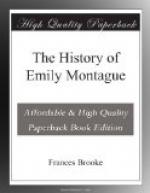Oct. 13.
I have this moment a letter from Miss Fermor, to press my return to Quebec; she tells me, Emily’s marriage is postponed till spring. My Lucy! how weak is the human heart! In spite of myself, a ray of hope—I set off this instant: I cannot conceal my joy.
LETTER 35.
To Colonel Rivers, at Quebec.
London, July 23.
You have no idea, Ned, how much your absence is lamented by the dowagers, to whom, it must be owned, your charity has been pretty extensive.
It would delight you to see them condoling with each other on the loss of the dear charming man, the man of sentiment, of true taste, who admires the maturer beauties, and thinks no woman worth pursuing till turned of twenty-five: ’tis a loss not to be made up; for your taste, it must be owned, is pretty singular.
I have seen your last favorite, Lady H——, who assures me, on the word of a woman of honour, that, had you staid seven years in London, she does not think she should have had the least inclination to change: but an absent lover, she well observed, is, properly speaking, no lover at all. “Bid Colonel Rivers remember,” said she, “what I have read somewhere, the parting words of a French lady to a bishop of her acquaintance, Let your absence be short, my lord; and remember that a mistress is a benefice which obliges to residence.”
I am told, you had not been gone a week before Jack Willmott had the honor of drying up the fair widow’s tears.
I am going this evening to Vauxhall, and to-morrow propose setting out for my house in Rutland, from whence you shall hear from me again.
Adieu! I never write long letters in London. I should tell you, I have been to see Mrs. Rivers and your sister; the former is well, but very anxious to have you in England again; the latter grows so very handsome, I don’t intend to repeat my visits often.
Yours,
J.
Temple.
LETTER 36.
To John Temple, Esq; Pall Mall.
Quebec, Oct. 14.
I am this moment arrived from a ramble down the river; but, a ship being just going, must acknowledge your last.
You make me happy in telling me my dear Lady H—— has given my place in her heart to so honest a fellow as Jack Willmott; and I sincerely wish the ladies always chose their favorites as well.
I should be very unreasonable indeed to expect constancy at almost four thousand miles distance, especially when the prospect of my return is so very uncertain.
My voyage ought undoubtedly to be considered as an abdication: I am to all intents and purposes dead in law as a lover; and the lady has a right to consider her heart as vacant, and to proceed to a new election.
I claim no more than a share in her esteem and remembrance, which I dare say I shall never want.




